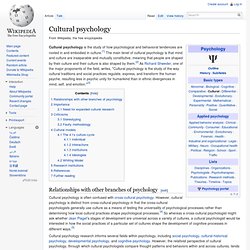

Emergence. Social Psychology Network. Instructional Design. Cultural psychology. Cultural psychology is the study of how psychological and behavioral tendencies are rooted in and embodied in culture.[1] The main tenet of cultural psychology is that mind and culture are inseparable and mutually constitutive, meaning that people are shaped by their culture and their culture is also shaped by them.[2] As Richard Shweder, one of the major proponents of the field, writes, "Cultural psychology is the study of the way cultural traditions and social practices regulate, express, and transform the human psyche, resulting less in psychic unity for humankind than in ethnic divergences in mind, self, and emotion.

"[3] Social networks, communication styles, and learning performance in a CSCL community. The aim of this study is to empirically investigate the relationships between communication styles, social networks, and learning performance in a computer-supported collaborative learning (CSCL) community.

Using social network analysis (SNA) and longitudinal survey data, we analyzed how 31 distributed learners developed collaborative learning social networks, when they had work together on the design of aerospace systems using online collaboration tools. The results showed that both individual and structural factors (i.e., communication styles and a pre-existing friendship network) significantly affected the way the learners developed collaborative learning social networks. More specifically, learners who possessed high willingness to communicate (WTC) or occupied initially peripheral network positions were more likely to explore new network linkages. Causal Determinism. 1.

Introduction In most of what follows, I will speak simply of determinism, rather than of causal determinism. Table of Contents: 7 September 2007; 317 (5843)